-
Background
Following Operation Peace Spring in the area, from which the US-led coalition withdrew to fight the Islamic State/ISIS, the terrain stretching from Ras al-Ayn/Serê Kaniyê to Tell Abiad was controlled by the Turkish army, while the armed groups of the National Army divided it among themselves, including the al-Jabha al-Shamia / Levant Front, Faylaq al-Majd / Majid Corps, and Ahrar al-Sharqiya / Rebels of the Eastern Area, which took position in Tell Abiad, while the Sultan Murad Brigade and the Hamza Division / Hamzat mainly controlled Ras al-Ayn/Serê Kaniyê. Other armed groups, including Jaysh al-Islam / Islam Army and Fayalaq al-Rahman / al-Rahman Legion, as well as the al-Safwa / Elite Brigade, operating under the Second Legion of the opposition-affiliated Syrian National Army, were also stationed in the area, however, in smaller numbers.
On 9 October 2019, Turkish President Rajab Tayyip Erdogan announced the launch of Operation Peace Spring in northern Syria, spearheaded by Turkish forces and allied rebel groups of the National Army of the Syrian Interim Government,[1] operating under the National Coalition for Syrian Revolutionary and Opposition Forces. A day before the start of the operation, the National Coalition for Syrian Revolutionary and Opposition Forces released a statement supporting the Turkish announcement of a looming military operation in the region. The statement said: “The Coalition supports the efforts of the National Army, the Ministry of Defense and those of the Joint Chiefs of Staff. We confirm the readiness of our National Army to combat terrorism in cooperation and joint action with brothers in Turkey.”[2]
The Turkish military invasion of Northeastern Syria led to a massive wave of displacement, especially the operation’s onset. According to the United Nations / UN, on the two weeks that ensued the operation’s launch, about 180,000 people, mostly women and children,[3] were displaced, 10,000 people of whom sought refuge in Kurdistan Region of Iraq (KRI). The invasion, furthermore, ended with the Turkish Army’s control of large Syrian territories.
-
Introduction
Following Operation Peace Spring, the National Army seized 12 grain silos (structures established for storing strategic grain stocks of the area’s residents) in Tell Abiad and Ras al-Ayn/Serê Kaniyê. On 1 December 2019, nonetheless, it retreated from the Aliyah silos’ area and from that of the al-Shirkrak silos on 9 December 2019 — both located on the M4 International Highway, under the Turkish-Russian agreement, most terms and provisions of which were undisclosed back then.[4]
Youssef al-Hamoud, spokesperson of the Syrian National Army, reported to local media outlets that one of the agreement’s terms provided for the spread of Syrian Regular Forces and their Russian counterparts south of the M4 highway, while The Turkish forces, along with the National Army’s factions are to take positions north the highway, which is to be supervised by joint Russian-Turkish patrols. The spokesperson also pointed out that Russia has already embarked on setting up a military base within the Aliyah silos’ area, located on the southern part of the M4.[5]

Photo no. (1) – Map locating the National Army’s posts in the region targeted by Operation Peace Spring.
When this report was completed, namely on 13 June 2020, the Turkey-backed National Army was in control of eight serviceable silos and two others, which, as mentioned above, were rendered out of service during the war on ISIS. Geographically speaking, the silos are located as follows:
- In Ras al-Ayn/Serê Kaniyê: There are the silos of Ras al-Ayn, Tal Halaf, al-Safeh, al-Mabrouka and al-Manajir.
- In Tell Abiad: There are silos of Tell Abiad crossing, al-Skhairat, al-Dehliz, and the unserviceable Slouk and al-Rashid.
It is worth mentioning that Ahrar al-Sharqiya / Rebels of the Eastern Area has transported large amounts of the grain storage preserved in the Aliya and al-Shirkrak silos to other places, before it retreated from the area and consigned the silos to the Syrian government in December 2019, in accordance with the above-mentioned Turkish-Russian agreement.
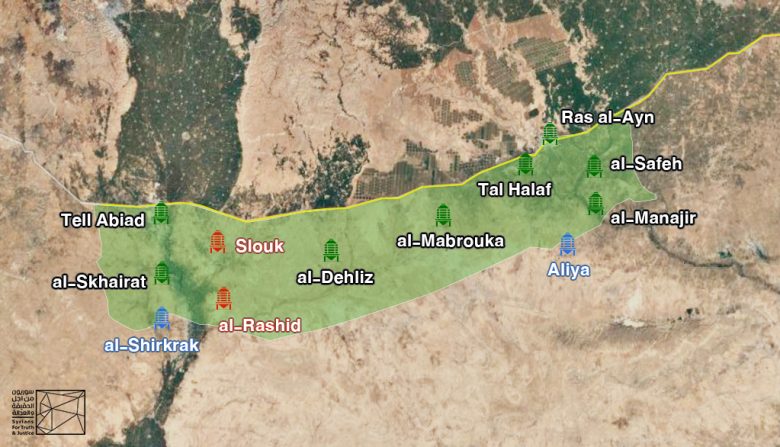
Photo no. (2) – Satellite image locating grain silos in the areas hit by Operation Peace Spring. The locations in red spot the al-Rashid and Slouk grain silos, both were rendered out of service during confrontations with ISIS in the years leading up to the Turkish invasion. On this, sources indicated that the silos are unserviceable due to the bombing initiated by the US-led coalition. The locations in green, nonetheless, spot the Tal Halaf, Ras al-Ayn, al-Safeh, al-Manajir, al-Mabrouka, al-Dehliz, al-Skhairat and Tell Abiad grain silos, which are yet held by the National Army. The locations in blue spot the Aliya and al-Shirkrak grain silos, which were consigned to the Syrian government and the Russian forces.
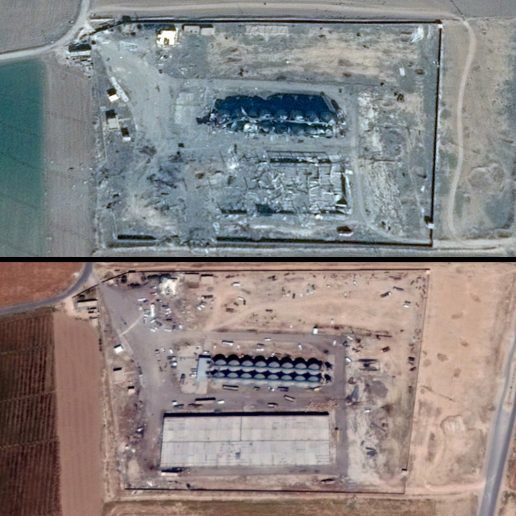
Photo no. (3) – The satellite image, on top, shows the destruction caused to the Slouk Grain Silos in Raqqa province, which is its current state. The one below, no. (4), is also a satellite image, however, taken on 15 February 2014.
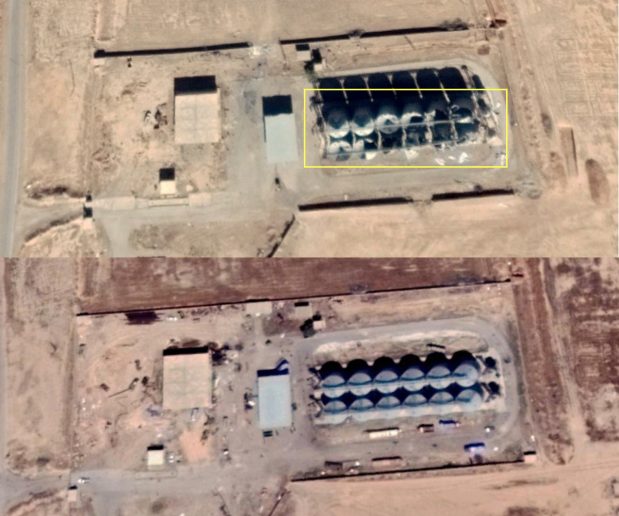
Photo no. (5) – The satellite image, on top, shows the destruction caused to the al-Rashid Grain Silos in Raqqa province, which is its current state. The one below, no. (6), is also a satellite image, however, taken on 15 February 2014.
-
Report Methodology
In this report, Syrians for Truth and Justice / STJ lists the details of the pillage and seizure of the grain silos in the areas targeted by Operation Peace Spring, launched by the factions of the Turkey-backed Syrian National Army. STJ, moreover, tracks a network of grain dealings, conducted by a Turkish government company, the Turkish Grain Board/ Toprak Mahsulleri Ofisi/ TMO, and Turkish merchants, who purchased, promoted and transported amounts of the grain storage to Turkey, in cooperation with the al-Sanabel Company, founded by the al-Jabha al-Shamia / Levant Front. There is also a process of coordination and cooperation involving Turkish merchants and armed groups’ commanders, who personally seized amounts of the grain storage, since several commanders confiscated already-looted grain, and then sold them to either local or Turkish merchants, the revenues of which are given to these persons, not the armed groups they are affiliated with. The largest revenue shares, however, are preserved for the armed group that seized the grain storage in the first place.
The report is based on online interviews that STJ conducted with over 12 persons, including commanders of the National Army and an official of the Syrian Interim Government, as well as employees and staffers of the grain silos, among others employed at the local councils constructed by Turkey in the area. The list of interviews also includes people informed of the seizure of the grain silos and the sales that involved Turkish merchants, given that the interviews were conducted at various intervals throughout February and May 2020.
STJ has repeatedly attempted to contact an official of or employees at the al-Sanabel Company; nonetheless, they refused to make a comment. Furthermore, STJ’s digital-fact-checking expert has collected, tracked and examined the information, photos and videos presented by open sources, which displayed the transport of large amounts of the grain silos’ storage. Additionally, the expert analyzed available visual evidence, offered by open sources, and accurately located the geographical spots reported here and cross-checked the evidence in comparison to the testimonies obtained by STJ. The latter process confirmed the seizure of the silos, the sale of amounts of the looted grain while other amounts were transported to places/buildings confiscated and turned into military stations, in a series of errands supervised by commanders of the National Army.
-
Grain storage before the Syrian National Army took over the silos
According to information obtained by STJ, nine out of the 12 silos were operational when the area was yet run by the Autonomous Administration, which unloaded and moved part of the stock before the Operation Peace Spring. The quantities transported by the Administration, included wheat, barley, fertilizers, cotton, and sterilized seed. The remaining storage, was then confiscated by the National Army, which was still being unloaded and transported when this report was being prepared. The Army has also emptied the al-Shirkrak silo of the largest grain amounts, which according to four local sources’ estimates amounted to more than 100,000 tons, before it withdrew from the area, leaving it to the Syrian government and Russian forces on 12 December 2019.
In this regard, STJ interviewed Salman Baroudo, joint head of the Commerce Committee of the Autonomous Administration. He said:
“The total amount, left by the Autonomous Administration in all silos before withdrawing from them, amounted to about 730, 000 tons of wheat, barley, fertilizers, cotton and seed. This stock is the strategic reserve for the next three years and constitutes 11% of the total stock of Al-Jazīrah Region— al-Raqqa and al-Hasaka provinces.”
The Economic Statistics Office of the Autonomous Administration issued a detailed report on the setback suffered by the agricultural sector following Operation Peace Spring, recording the sector’s losses between 8 October 2019 and 5 November 2019. The report stated that the contents of the silos of Ras Al-Ain / Sri Kanye and Tell Abiad regions of wheat amounted to (42,700 tons), seeds (2,300 tons), barley (33,000 tons), while the amount of cotton in al-Safeh silos reached (2,600 tons).[6]
STJ’s field researcher contacted Nabila Mohamed, the joint head of the Democratic Society Development Companies in north and eastern Syria. She explained that every ton of wheat produces about 850 kilograms of flour, while a ton of flour produces about 1.2 tons of bread ready for distribution to the population, adding that in Ras al-Ayn/Serê Kaniyê alone there are 17 bakeries, private and public, which combined require about 400 tons of flour per week.
Putting the figures mentioned-above into a simple equation, STJ’s field researchers concluded that a ton of bread ready for distribution equals approximately 7,000 loaves on average.
The sources, interviewed by STJ on this regard, confirmed that the silos controlled by the National Army in the area of Operation Peace Spring were almost completely full with grain stocks, for the Autonomous Administration was unable to unload large quantities of grain prior to its withdrawal.
An employee of the Agriculture Office of Tell Abiad Local Council said that the area’s silos were almost full when the National Army took them over. He added:
“The Syrian Democratic Forces/SDF withdrew from the area suddenly and could not unload the silos’ content, not even a small amount of it. The silos were almost completely full, ;8when the National Army took hold of them, especially the silos of al-Dehliz, al-Skhairat, al-Mabrouka, Tal Halaf and Ras al-Ayn. These silos were at their full storage capacity that amounts to eight / nine thousand tons, not to mention the areas surrounding them, which can accommodate about 15000 tons.”
The employee, and two other sources contacted by STJ, explained that the al-Safeh silos contained 25000 tons, while Aliya silos contained about 37 000 tons. The contents of the two silos, along with the stocks in the al-Manajir silos, was transported before the Autonomous Administration/SDF retreated from the area. In the case of the al-Shirkrak, the largest of all as it has a capacity to accommodate 100 000 tons, the SDF managed to transport some 4 000 tons only before it left the area. The sources, however, could not ascertain whether the National Army managed to unload the full content or only major quantities of the al-Shirkrak silos’ contents before it consigned them to the Syrian government and the Russian forces in December 2019.
-
Grain storage looted by National Army’s factions:
In press statements, the National Army refuted that its legions or any of the armed groups affiliated with it have embarked on looting the contents of the silos. Nevertheless, the evidence collected by STJ proves just the opposite. Investigations have also concluded that Turkey facilitated selling quantities of the looted storage and helped in transporting it to its territories, while it took no action to stop or prevent the factions from stealing the grain storage, which is the only food resource the area’s population has.
In an exclusive statement made to Aleppo Today on 12 December 2019, the National Army’s spokesperson, Major Youssef al-Hamoud,[7] denied that any of the Army’s factions have transported any of the silos’ grain contents, adding that the silos will be assigned to the local councils to be run, backed by the National Army. Nonetheless, testimonies that officials of the Syrian Interim Government and employees of the local councils contradicted the spokesperson’s statements, for the witnesses stressed that what happened on the ground was totally different.
The witnesses, interviewed by STJ, including an official of the Syrian Interim Government, affiliated with the Syrian National Coalition, and a commander of the al-Rahman Brigade, as well as employees of the grain silos accentuated that the National Army has seized the full contents of the silos and divided it into shares, granted to individuals and to armed groups. They added that a number of commanders have taken personal shares besides the ones their factions’ have already seized.
The testimonies and information obtained by STJ indicate that the main armed groups that jointly controlled the silos are the following:
- Hamza/Hamzat Division: It seized the al-Safeh, Tal Halaf and Ras al-Ayn silos.
- Al-Jabha al-Shamia/Levant Front: It seized the Tell Abiad Crossing’s silos, monopolizing the sale and transport of grains to Turkey through the al-Sanable Company.
- Ahrar al-Sharqiya/Rebels of the Eastern Area: The armed group seized the al-Mabrouka, al-Dehilz, al-Skhairat and al-Manajir silos.
- Faylaq al-Majd/al-Majid Corps and the al-Jabha al-Shamia/Levant Front have also obtained various grain shares, as they transported the shares from different silos and stored them in several locations.
On this note, an official of the Syrian National Coalition-affiliated Interim Government said:
“The armed groups of the National Army have not shifted the administration of silos neither to the Interim Government nor to any of its affiliated institutions. We were not even handed any quantities of the grain stocks. The armed groups believe the storage to be a spoil of war they are entitled to deal with the way they wish. We also believe that an implicit Turkish permission has been granted to the armed groups as to embark on looting the storage, or at least Turkey was informed of their actions, however, it chose to wave the matter off as if unnoticed.”
The official added that the Interim Government attempted to reach an agreement with the armed groups concerning the grain storage, but the latter refused to hand it in, being their source of funding. The Interim Government, furthermore, does not have a budget allocated to building a grain center in Operation Peace Spring’s area. He added:
“We proposed several projects to preserve the grain storage and to help us build a grain center in the area, but we received no answer from the armed groups. Accordingly, it is these groups who are running the area’s grain market.”
-
Immediate perpetrator of the silos’ looting
The Ahrar al-Sharqiya/Rebels of the Eastern Area and the Hamzat Division are considered the immediate perpetrators of the seizure and looting of the silos’ contents in the areas of Operation Peace Spring. The selling transactions, however, were solely done by the al-Jabha al-Shamia/Levant Front, which offered the looted grain stocks for sale either in local markets, privately owned bakeries, or to Syrian merchants, or otherwise to Turkey through the al-Sanabel Company, which it founded as an economic façade.
The Levant Front, several sources interviewed by STJ reported, monopolized selling all types of grain to Turkish companies. Additionally, the al-Majid Corps was banned from selling its barley shares unmediated to a Turkish company, for the Levan Front has annulled the sale and prevented the Corps from striking any immediate deals with potential customers, thus, keeping a hegemony over grain sale deals.
A. Al-Jabha al-Shamia/Levant Front
The Levant Front faction was founded on 24 December 2014, under the command of Abdulaziz Salama through the merger of several factions, including ones affiliated with Ahrar al-Sham, Liwa al-Tawhid/ al-Tawhid Brigade/ Oneness of God, Jaysh al-Mujahideen/Army of Mujahideen, Fastaqim Kama Umirt Union/ Union of Be Upright as Ordered, the Nour al-Din al-Zenki Movement and Jabhat al-Asala/ the Authenticity and Development Front —namely key armed groups in Aleppo province. Today, the Levant Front is led by Captain Mohamed Al-Fateh.
In April 2015, several factions split from the Levant Front, including Ahrar al-Sham, the Nour al-Din al-Zenki Movement, al-Fouj al-Awal/First Regiment and al-Safwa al-Islamya / the Islamic Elite Brigades. In January 2017, the Levant Front joined the ranks of the opposition-affiliated Syrian National Army; it formed and commanded its third corps, which encompasses four divisions and seven brigades.
The Levant Front spearheaded confrontations with the Syrian regular forces in Aleppo and participated, backed by Turkey, in the operations Euphrates Shield, Olive Branch and Peace Spring. In these areas where the three operations were waged, the faction committed several violations against the indigenous residents and people displaced to it, ranging from arbitrary arrests and detentions to obtain money, to seizing private properties, not to mention looting and pillaging public properties.
B. Ahrar al-Shariqiya/Rebels of the Eastern Area
Tajamu Ahrar al-Sharqiya / Rebels of the Eastern Area’s Union was founded in 2016 and is currently led by Major Abu Hatim Shaqra, whose full name is Ahmad Ihsan Fayyad al-Hayes, and his mother’s name is Souria. Al-Hayes was born in 1987 and is originally from the al-Shaqra village, western rural Deir ez-Zor.
The faction’s statements acknowledge its affiliation with the First Corps – Division 12 – Brigade 123, which operates under the General Staff of the Ministry of Defense of the Syrian Interim Government, an offshoot of the National Coalition for Syrian Revolutionary and Opposition Forces.
Sources, contacted by STJ, said that Ahrar al-Sharqiya encompasses several other small armed groups, such as the al-Qadisiyah faction, the Ahl al-Athar Faction, the Ahrar al-Tabqa/Rebels of al-Tabqa, Jaysh al-Ahfad/Army of Grandchildren, 20th Division 20, and Adel Union/ Justice Union, that mainly consist of fighters from Raqqa province. Ahrar al-Tabqa, for its part, is led by a person nicknamed “al-Khal”, who is also from Raqqa province. The Army of Grandchildren, however, is commanded by Abu Ahmad Muhana.
When the Union was first founded, the names of several groups emerged, including al-Ahwaz Brigade, Dir al-Anssar/ Helpers’ Shield, Jund Al-Tawhid/Soldiers of Oneness, and Liwa al-Baraa bin Malik/ Barra bin Malik Brigade. A segment of the Union’s fighters is from Raqqa and Hasakeh provinces, as well as Maskana and Manbij. The majority of the fighters operating under Ahrar al-Sharqiya, nonetheless, is from Deir ez-Zor province, the descendants of the Bakara / Baggara clan.
Abu Hatim Shaqra left Jordan, where he used to work, for Syria in July 2011, and commanded his first military operation, which aimed at a checkpoint of the Syrian regular forces in Harran al-‘Awamid, rural Damascus, sometime in late 2011. He stayed in Eastern Ghouta region until 2013, where he joined the Harakat Ahrar al-Sham al-Islamiyya / Ahrar al-Sham, and then moved to Deir ez-Zor in 2014, where he continued to fight for Ahrar al-Sham. Next, he left Deir ez-Zor province when Jabhat al-Nusra/al-Nusra Front and later the Islamic State / ISIS controlled the area, as they were at odds, which triggered the latter to expel him from the province.
The faction’s fighters were stationed in Idlib province, especially in Sarmada, before their subsequent stationing in the city of al-Bab, northern rural Aleppo. There, the faction was fully funded and backed by Turkey, taking the al-Rai city as its headquarters, while having a large military post in the city of al-Bab.
Under the command of the Turkish army, Ahrar al-Sharqiya participated in Operation Euphrates Shield, launched by the Turkish forces on 24 August 2016, to control the cities of Jarabulus and al-Bab, among others. In early 2018, the faction participated again under the command of the Turkish army in Operation Olive Branch, waged on 20 January 2018, which this time aimed at the Syrian Afrin district, which population consists of a majority of Kurdish families. For the third time, also under the command of the Turkish army, the faction took part in the Operation Peace Spring on 9 October 2019 to take over the areas of Tell Abiad and Ras al-Ayn/Serê Kaniyê in the Syrian province of Hasaka.
C. Hamza/Hamzat Division
On 24 April, First Lieutenant Saif Abu Bakr announced the formation of the Hamza Division after the merger of five brigades in northern rural Aleppo—namely the Hamza Brigade, the Dhi Qar Brigade, the Raad al-Shamal Brigade/Northern Thunder, the Mari` al-Samoud / Mari’ Resolve Brigade and the Special Tasks Brigade. Several months later, another group of factions joined Hamzat’s ranks, on top of which were Samarkand Brigade that split from the division later. The Hamzah / 22nd Division is financed by Turkey and is part of the 2nd Legion of the opposition-affiliated Syrian National Army, which is also Turkey-backed.
D. The al-Majid/Glory Corps
The al-Majid/Glory Corps was established in 2017, under the leadership of Yamen Taljo, himself a dissident from al-Islam Army, with a number of other fighters. Taljo then founded the Corps, which incorporated no more than 200 fighters at the time, according to media reports.
The Corps is affiliated with 3rd Legion of the Syrian National Army, operating under the General Staff of the Ministry of Defense of the Syrian Interim Government, which is a part of the Istanbul-based National Coalition for Syrian Revolutionary and Opposition Forces.
In 2018, Major Yasser Abdulrahim, a commander of al-Sham Legion, joined the ranks of the al-Majid Corps, with a number of fighters who defected due to internal disagreements. Abdulrahim was appointed the Corp’s military commander. Additionally, fighters from the Nour al-Din al-Zanki Movement joined the Corps, when the former dissolved itself in early 2019, bringing the number of the faction’s fighters to about 3000, born in various Syrian provinces.
Yamen Taljo – the Corps’ founder- hails from Aleppo city. Prior to commanding the faction, he was a military official of the Islam Army – Northern Sector and its delegate to Astana talks in 2017, to which Russia, Turkey and Iran serve as guarantor states. Local activists accuse him of embezzling funds and weapons provided to the Islam Army– Northern Sector upon his dissent. Operation Olive Branch, which Turkey launched with the participation of the National Army in Afrin at the onset of 2018, was the first military operation al-Majid Corps fought with support from Turkey, since the latter is the ultimate funder of the faction’s operations. The faction also fought alongside the Turkish forces in Operation Peace Spring on 9 October 2019, and focused its activity in Tell Abiad area, Raqqa province. There, it committed violations that also included seizing homes belonging to the province’s residents, stealing shops, arresting civilians, and mutilating dead bodies of SDF-affiliated fighters.
-
Looted Grain Storage and Transportation
Several photos and videos went viral, showing trucks loaded with grain bags in several locations within the Operation Peace Spring areas, in addition to which truck clusters were monitored in front of a number of silos in November and December 2019.
On 9 December 2019, EuphratesPost, a news outlet, published a photo showing a convoy of trucks loaded with grain on the Tell Abiad road, apparently coming from Tell Abiad Silos.
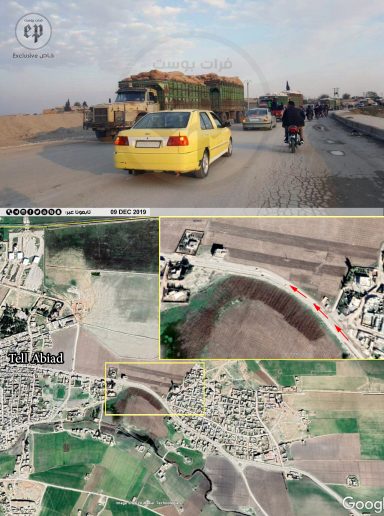
Photo No. (7) – The one at the top, published by EuphratesPost, shows a convoy of trucks loaded with grain on the Tell Abiad road, near the Turkish borders. Photo no. (8) – The one below locates the route taken by the convoy towards the Syrian city of Tell Abiad, near the Turkish borders. This are the road’s coordinates: 36.696010, 38.967564.
On 11 December 2019, the Rojava Activists Network released a video showing more than 10 trucks and captioned it as: “Trucks unloading grain stocks in storehouses near al-Balou Gas Station, on the main road to Tell Abiad. STJ’s digital-fact-checking expert analyzed the video and found that it was filmed in Tal Halaf silos, not at the location the network referred to.
Moreover, the video does not clearly display whether the process being carried out is loading or unloading of the grain stocks, neither its direction, whether from or to the silos. However, it confirms the transportation of grain and the large number of trucks assigned for this purpose.
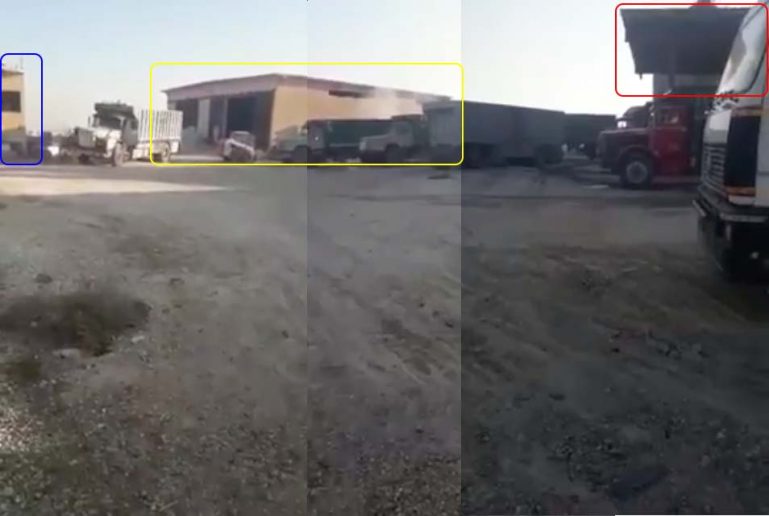
Photo no. (9) – A merged photo taken from a video posted by the Rojava Activists Network on 11 December 2019, where a number of trucks appear, captioned as parked at one of Tell Abiad’s warehouses.
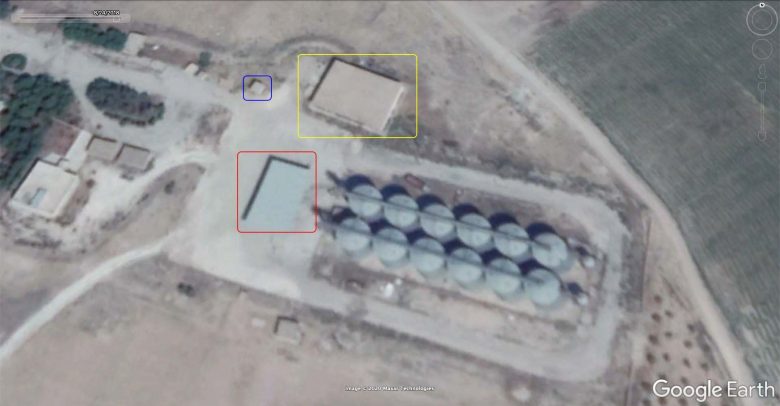
Photo No. (10) – Satellite image showing the precise location of the previous photo and video published by Rojava Activists Network, where the video was filmed, namely at Tal Halef silos near Ras al-Ayn/Serê Kaniyê.
The Rojava Activists Network also reported that large quantities of grain were accumulated near al-Abbas Gas Station in Farajah village, rural Tell Abiad, and other quantities at the New Court Roundabout, Tell Abiad city. These stored quantities of grain belong to an Ahrar al-Sharqiya Commander, Mohammad al-Zahir, nicknamed Abu Azzam, indicated the Network, adding that other personalities are also involved in buying the stolen grain.
STJ tracked the storage sites reported by Rojava Activists Network, and satellite imagery showed that these quantities do exist at the mentioned location.
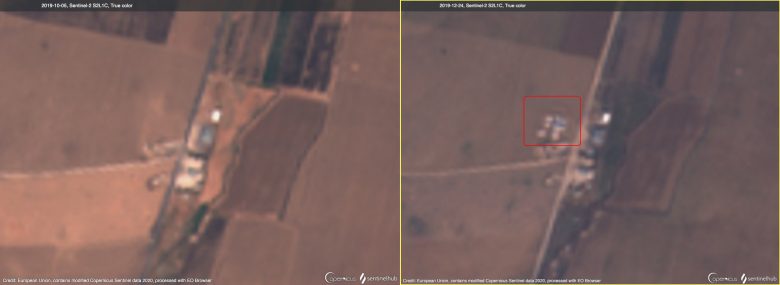
Photo No. (11) – Satellites image taken on 20 December, 2019, showing a pile of grain near the al-Abbas Gas Station in the Farajah village, rural Tell Abiad, the site referred to by the Rojava activists network.
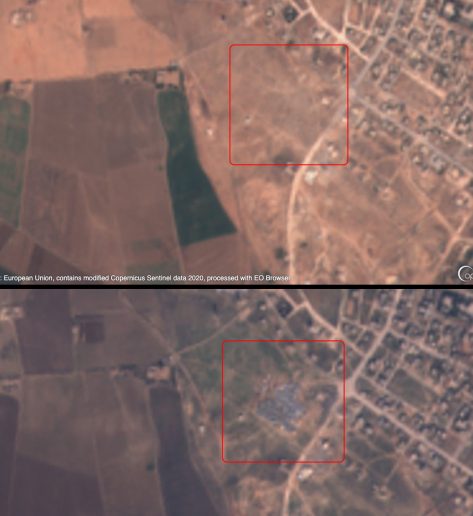
Photos No. (12) at the top and (13) at the bottom – Satellite images of the New Court Roundabout area. The first was taken on 5 October 2019, where the square marked red appears empty, while in the second image, taken 24 December 2019, shows grain stacks in the same area.
On 8 May 2020, STJ’s field researcher took a picture of the grain quantities / piles, stored at the court roundabout.
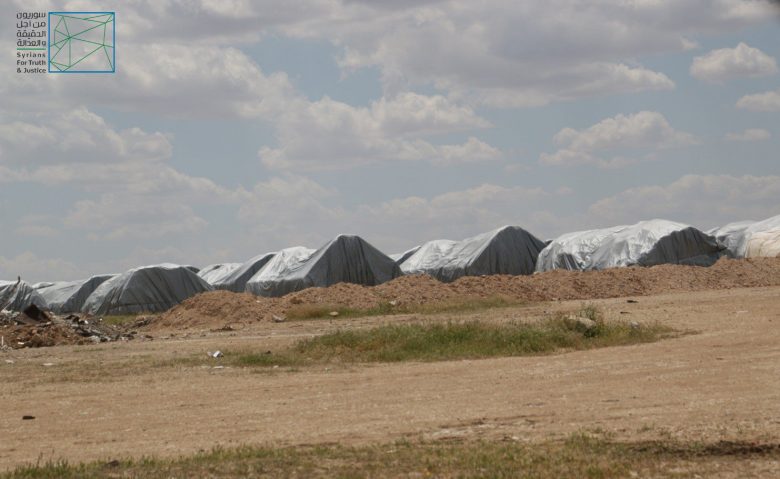
Picture No. (14) – shows piles of grain located near the Court Roundabout in Tell Abiad city on 8 May 2020, transported by Ahrar al-Sharqiya from one of the silos it seized and stored there. Photo credit: STJ.
STJ’s field researcher in Tell Abiad city monitored the faction of the al-Jabha al-Shamia/Levant Front storing the grain they seized near the “court building” in addition to the grain silos at the border crossing, while the al-Majid Corps stored a portion of the grain at the Agricultural Bank’s building and another portion at the Cement Corporation’s warehouses.
STJ’s field researcher also reported that the al-Majid Corps and the Levant Front factions began transferring their shares of grain as soon as the fighting ended, while Ahrar al-Sharqiya did not transfer its share because it seized most of the silos and buildings.
Tell Abiad news channel, on Telegram, also posted a video showing trucks loaded with grain on the Tell Abiad road, saying that the trucks belonged to the al-Sanabel Company, operated by the Levant Front. STJ’s digital-fact-checking expert tracked the video and managed to accurately locate the site where the video was filmed, as near Tell Abiad silos at the Turkish border. The site can be located via these coordinates: 36.702208, 38.951311

Photo No. (15) – A photo posted by the Tell Abiad News channel on the Telegram, captioned as trucks of the al-Snable Company of the Levant Front, transporting grain on Tell Abiad road.
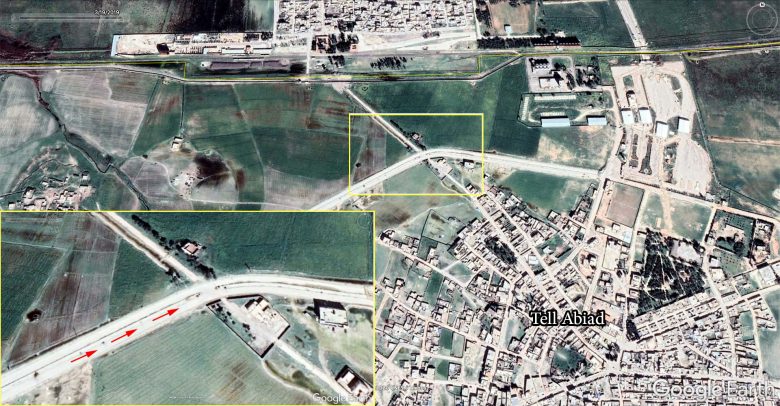
Photo No. (16) – A satellite image shows the road taken by the trucks referred to in photo 13, near the silos of Tell Abiad at the Syrian-Turkish border.
Taken on 16 November 2019, satellite images of the al-Dehliz silos, which STJ inspected, showed that large quantities of grain were accumulated at the silo’s square. Another photo, taken on 8 December, showed Trucks inside the yard and a clear decrease in these quantities compared to the ones appearing in the first image. STJ refrains from publishing the photos due to property rights and service provider’s refusal to grant it a publishing permit.
Another satellite image, captured on 19 November 2019 of the Aliya silo, shows trucks at the main entrance to the silo. Furthermore, several sources told STJ that Ahrar al-Sharqiyya faction had almost completely moved the silo’s grain stocks to al-Manajir silos before handing them over to the government forces and Russia on 1 December 2019 under the Russian-Turkish agreement. STJ refrains from publishing the photos due to property rights and service provider’s refusal to grant it a publishing permit.
STJ contacted one employee at the al-Safeh silo, controlled by the Hamza / Hamzat Division, who said that grain was yet being transported when the report was being prepared. He added:
“The person immediately in charge of the al-Safeh silos is Abu Samer al-Shamali. There are 12 workers here. We make a daily 13 thousand Syrian pounds each. Every day, we load four trucks with grain. The trucks first head to Ras al-Ayn/Serê Kaniyê and next to the Tell Abiad crossing, given that grain is exclusively transported to Turkey through the Tell Abiad border crossing.”
-
Looted grain sold locally
According to information obtained by STJ, part of the stolen silos’ stock was sold locally to merchants in the areas of Operations Euphrates Shield and Peace Spring, especially wheat, of which only small amounts were stored in the silos compared to other grains.
In Tell Abiad, Ahrar al-Sharqiya faction sells wheat to local merchants, who then sign contracts with privately-owned bakeries to supply them with flour. The price of a ton of flour is estimated at 1,000 Turkish Liras, the equivalent to $140. Wheat is usually milled at the Skhairat Mill, which is also controlled by Ahrar al-Sharqiya, producing a 50 ton of flour a day.
A commander of al-Rahman Legion told STJ that Ahrar al-Sharqiya faction sold part of the grain locally to merchants in the Operation Spring Peace areas, while they were in control of the silos, namely in October 2019. Abu Azzam, one commander of Ahrara al-Sharqiya, sold the barely ton for 20,000 Syrian Pounds, the wheat ton for 65,000 Syrian pounds and the fertilizer ton for 100,000 Syrian pounds.
Furthermore, several media reports stated that factions of the National Army have embarked on selling a portion of the looted grain, especially wheat, to the Syrian government. On this note, an official of Tell Abiad Local Council told STJ’s field researcher the following:
“The factions have concluded agreements to sell the looted stocks to local merchants they are related to. These merchants, however, are reputed for being war merchants and maintain ties with the Syrian government. They are also known for their commercial dealings with the regime, since the Autonomous Administration’s rule of the area. Some commanders have contacted these merchants personally, including: ‘Abu Dalu,’ ‘A. al-Kdiarat / al-Qdairat’ and ‘Kh. al-Qudood,’ as they were previously selling grain, especially wheat, to the regime, while the Autonomous Administration’s checkpoints charged them 150,000 Syrian pounds for each truck in exchange for a permission that allows them to pass through their areas towards the regime-held ones.”
He added:
“The looted grain now is being transferred from the factions’ areas to those of the regime, by the merchants who buy them without having to pay royalties for transit because they are buying the cargo from the factions themselves. Nonetheless, I think by the new harvest season, the factions will impose transit royalties on the merchants or they will force farmers to sell them wheat, so they would sell it to the merchants.”
-
Turkey’s role in purchasing looted grain stocks:
The Turkish Grain Board/ Toprak Mahsulleri Ofisi / TMO purchases barley only from the area of the Operation Peace Spring and transports it to Turkey through shipping companies it has contracts with according to official tenders. In this regard, Turkish and Syrian media reports stated that the TMO announced its intention to purchase 20,000 tons of barley on 9 January 2020. Additionally, the Minister of Economy of the Syrian National Coalition’s Interim Government, in a press statements on 9 January 2020, said that:[8]
“The agreement provides for Turkey’s import of unlimited amount of excess barley from the Syrian city of Tell Abiad, paying 1,100 TL per ton for first class barley. Turkey will not pay customs fee for transporting barley through the Syrian-Turkish border.”
However, an official of the Syrian Grain Office / Seed General Organization for Seed Multiplication told STJ that:
“There is no agreement or understanding between the Turkish government and the Ministry of Economy regarding the import of barley. Rather, barley was purchased by the Turkish Grain Board through intermediaries, most notably the Sanabel Company, which is managed by the Economic Office of the Levant Front.”
In Syria, the Levant Front, which controls the Tell Abiad crossing and its silos, monopolizes trade with Turkey, and requires all parties wishing to sell or buy from Turkey to conduct all these transactions through its company, while it imposes taxes / royalties on all commercial dealings.
In addition to that, most of the barley quantities the region’s merchants, dealing with Turkey, have are the ones they purchased from the armed groups, which looted them from the silos in the first place. Consequently, the barely purchased by Turkey is the one stolen from the silos, not to mention that the company, with which the TMO deals, belongs to a military faction that also seized some grain stocks on the one hand, and used its influence to control the trade process on the other.
STJ’s field researcher contacted several persons who tried to sell barley to the TMO and were forced to sell it through al-Sanabel Company, which played the intermediary, at prices much lower than the ones advertised. For his part, an official of the Tell Abiad Local Council, said:
“The local council tried to intervene to market and sell the barley to the TMO at a price of 1,100 TL per ton for first class grains and 1,000 TL per ton for the second class, but the Levant Front refused to make an agreement with the Council and prevented it from addressing the matter. It also made the transactions its exclusive right. It even prevented the al-Majid Corps from selling barley to Turkey once.”
He added:
“In April 2020, the merchants will be buying a ton of barley from the factions controlling the silos at a price of 90,000 Syrian pounds, but the Levant Front, through the al-Sanabel Company, refuses to conduct the purchase process at this price. The Front claims that merchants have originally bought it from the Free Army at a very low price, in addition to the fact that barley is a spoil of war, not the property of the merchant. As for the purchase from farmers, Al-Sanabel Company announced that it buys a ton of barley for $100 to $115, but the truth is that it pays 90,000 Syrian pounds only.”
In a tweet posted on 28 May 2020, the Ras al-Ayn/Serê Kaniyê Local Council announced that the TMO and the council are studying the possibility of purchasing this year’s crops from farmers. The prices of wheat and barely, nevertheless, will be determined soon.
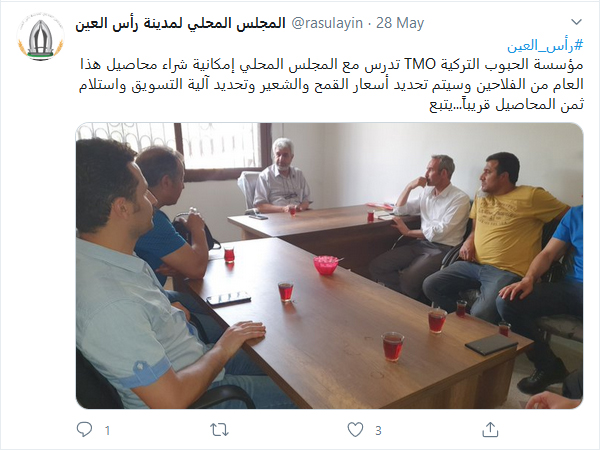
Photo no. (17) –Taken from the above-mentioned Tweet.
On 12 June 2020, the council posted another tweet, defining the minimum prices of wheat and barley, saying:
“We inform our farmer brothers that he who wants to market and sell wheat and barley crops to the Turkish Grain Office/ TMO has to open a PTT account at the National Hospital, where the price of the corps is to be deposited, given that the minimum price of barley is 1,000 TL and is 1300 TL for wheat.”
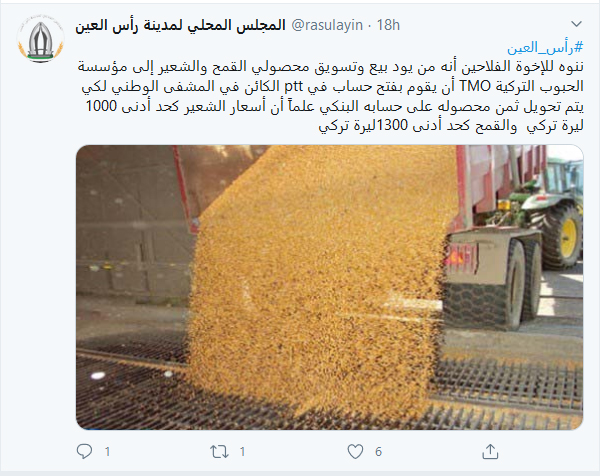
Photo no. (18) – is taken from the above-mentioned Tweet.
The Turkish government attempted to provide “legal coverage” for the purchases of looted and seized grain from areas controlled by the factions of the Syrian National Army through allowing its crops office, TMO, to open at least two branches in the areas of Operations Euphrates Shield and Peace Spring. The TMO used the branches to zeal grain/crops purchase deals without intermediary and in coordination with the factions’ commanders, resorting mainly to the al-Sanabel Company, established by the Levant Front, in addition to the TMO announced official tenders, which permitted the transport of the purchased of grain from Syrian territories to Turkey.
These tenders were advertised on several Turkish websites that derive their information from the tenders’ official website (electronic public procurement platform) (ekap.kik.gov.tr).
On 7 January 2020, for example, a tender was announced on (ihalebul.com) regarding the transportation of 20,000 grain tons by land to TMO warehouses in Urfa from the Syrian city of Tell Abiad. (The tender entered into force on 6 January 2020 and continues till 30 June 2020). The international transportation company (Öz – Duy Uluslararası Taşımacılık ve Ticaret Limited Şirketi) won the tender and obtained the “right” to ship the grains. The contract was signed between the company and TMO on 3 January 2020.
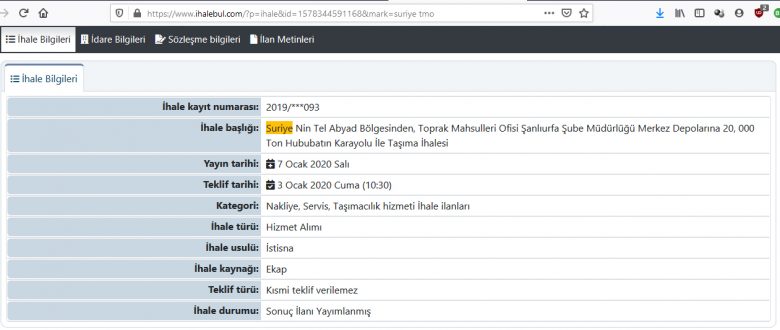
Photo no. (19).
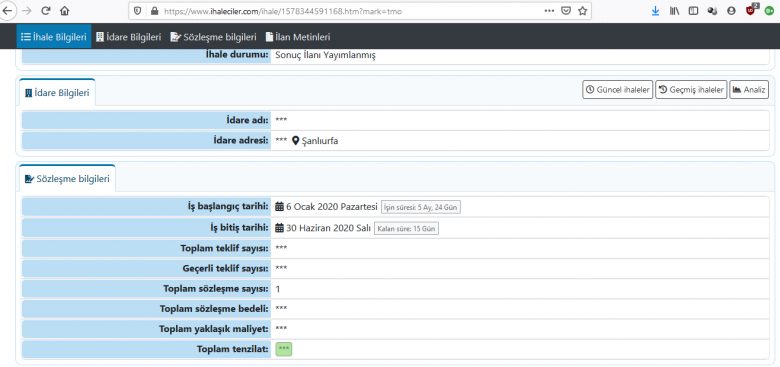
Photo no. (20).
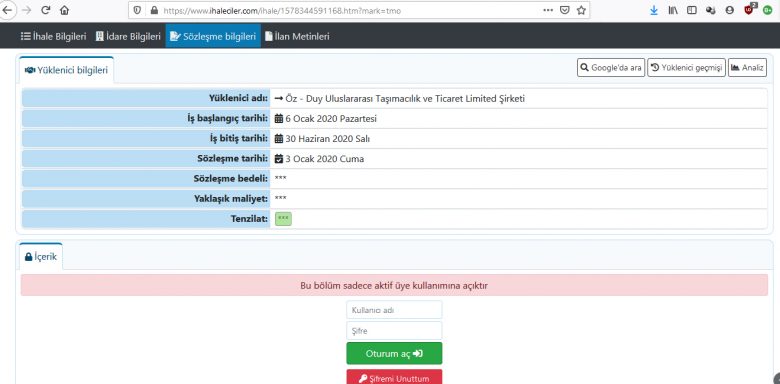
Photo no. (21). Photos no. (19), (20), (21) –are all taken from the advertisement of the tender mentioned and explained above.
It is important to mention that on 4 June 2019, the Turkish government announced the import of crops (including wheat) from the area that is subject to the Syrian armed opposition groups, which the statement described as “safe areas in Syria” according to (http://kentgazetesi.biz),[9] while it listed 13 grain types.
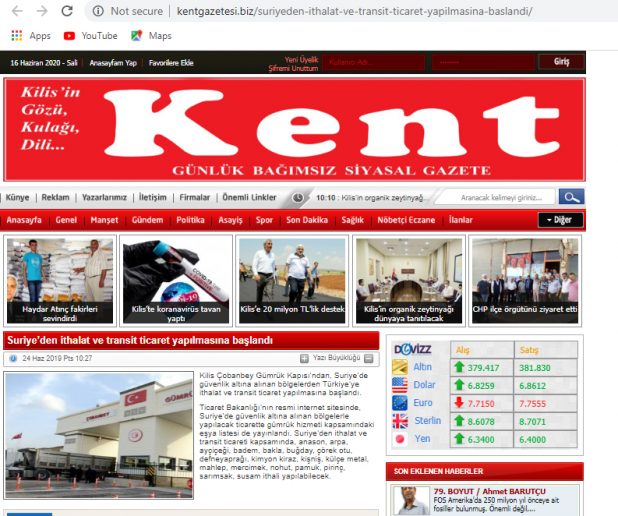
Photo no. (22) – The announcement.
Contrary to the statements of the Minister of Economy of the Syrian Interim Government / Syrian Opposition Coalition- Abdel Hakim Al-Masry, to the Syrian newspaper Enab Baladi,[10] made on 9 January 2020, in which he reported that wheat was ruled out of the agreement with the Turkish government, which provided for importing barley from the city of Tell Abiad, northern rural Raqqa province, to Turkey, the latest posts published on 28 May 2020 by the Ras al-Ayn/Serê Kaniyê Local Council, established by Turkey, explicitly confirmed the TMO’s purchase of wheat, which minimum price was determined after a meeting with the TMO.
After a media uproar in Turkey over importing wheat from Syria (in Parliament and the press), the TMO’s Director Ahmet Güldal, on 10 January 2020, denied the TMO’s intention to purchase wheat from Syria and reported that they will be procuring barley only.[11] Later, wheat imports from Syria were justified on the pretext of manufacturing food items (such as pasta and biscuits) in Turkey, which will be dedicated for export.
[1] Erdogan in a tweet: “I would like to kiss the foreheads of all hero members of the Mohammadan Army, participating in “Operation Peace spring”, and I wish success to them and all the local supportive elements that stand side by side with Turkey in this operation, God bless you and was in your help”, Erdogan’s official Twitter account, October 9, 2019, (last visit: 16 June 2020). https://twitter.com/rterdogan_ar/status/1181927322271830016?s=20
[2] “Syrian Coalition Reaffirms Commitment to Fighting Terrorism & Liberating Syria from Tyranny & Terrorist Orgs”, a press release by the Syrian National Coalition – Syria Department of Media & Communications, October 8, 2019. Last visited: 16 June, 2020. http://en.etilaf.org/press/syrian-coalition-reaffirms-commitment-to-fighting-terrorism-liberating-syria-from-tyranny-terrorist-orgs.html
[3] “Latest refugee influx to Iraq passes 10,000 mark as humanitarian needs mount in Syria,” UNHCR, 25 October 2019. Last visited: 16 June 2020. https://www.unhcr.org/en-us/news/briefing/2019/10/5db2b1644/latest-refugee-influx-iraq-passes-10000-mark-humanitarian-needs-mount-syria.html
[4] “All you need to know about the Turkish-Russian Agreement on Northern Syria,” Euronews, 23 October 2019. Last visited: 16 June 2020. https://arabic.euronews.com/2019/10/23/all-you-need-to-know-about-the-turkish-russian-agreement-on-northern-syria
[5] “Having redeployed in Aliya, Joint Russian-Turkish Patrol on Road,” Syria TV, 8 December 2019. Last visited: 17 June 2020. https://www.syria.tv/%D8%A8%D8%B9%D8%AF-%D8%A5%D8%B9%D8%A7%D8%AF%D8%A9-%D8%A7%D9%84%D8%A7%D9%86%D8%AA%D8%B4%D8%A7%D8%B1-%D9%81%D9%8A-%;8D8%A7%D9%84%D8%B9%D8%A7%D9%84%D9%8A%D8%A9-%D8%AF%D9%88%D8%B1%D9%8A%D8%A9-%D8%AA%D8%B1%D9%83%D9%8A%D8%A9-%D8%B1%D9%88%D8%B3%D9%8A%D8%A9-%D8%B9%D9%84%D9%89-%D8%A7%D9%84%D8%B7%D8%B1%D9%8A%D9%82-m4
[6] “Economic losses effected by the Turkish invasion in Statistics.” Last visited: 18 June 2020. http://www.aboriyacivaki.com/wp-content/uploads/2019/11/%D8%A7%D8%AD%D8%B5%D8%A7%D8%A6%D9%8A%D8%A9-%D8%A8%D8%A7%D9%84%D8%A3%D8%B6%D8%B1%D8%A7%D8%B1-%D8%A7%D9%84%D8%A7%D9%82%D8%AA%D8%B5%D8%A7%D8%AF%D9%8A%D8%A9-%D8%A7%D9%84%D9%86%D8%A7%D8%AA%D8%AC%D8%A9-%D8%B9%D9%86-%D8%A7%D9%84%D8%BA%D8%B2%D9%88-%D8%A7%D9%84%D8%AA%D8%B1%D9%83%D9%8A.pdf
[7] “Syrian National Army accused of pillaging grain silos in Northeastern Syria: Commander Responds,” Aleppo Today, 12 December 2019. Last visited: 17 June 2020. https://halabtodaytv.net/archives/118104
[8] “Turkey imports barley from Syrian city of Tell Abiad,” Enab Baladi on 9 January 2020. Last visited: 18 June 2020. https://www.enabbaladi.net/archives/354429.
[9] “Suriye’den ithalat ve transit ticaret yapılmasına başlandı”. 24 June 2019. Last visit: 18 June 2020.
[10] “Turkey imports barley from Syrian city of Tell Abiad,” Enab Baladi on 9 January 2020. Last visited: 18 June 2020. https://www.enabbaladi.net/archives/354429
[11] TMO, Suriye’den arpa alıyor. 10 January 2020. Last visited: 16 June 2020. https://www.tarimdunyasi.net/2020/01/10/tmo-suriyeden-arpa-aliyor/

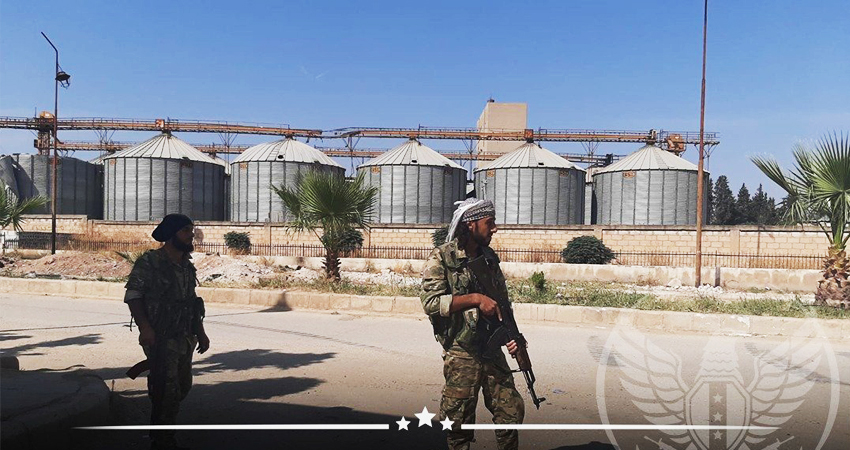
1 comment
[…] Peace Spring, Thousands of Tons of Grain Seized as ‘Spoils of War’,” STJ, 22 July 2020. https://stj-sy.org/en/following-operation-peace-spring-thousands-of-tons-of-grain-seized-as-spoils-o… (Last visited: 15 February […]